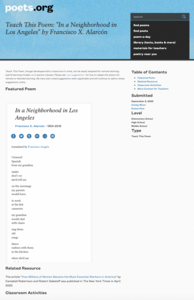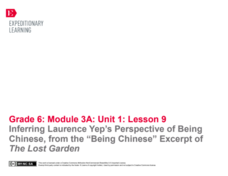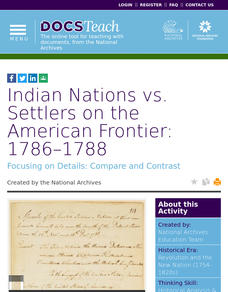University of the Desert
How Do I Feel That My Culture Is Misunderstood by Others?
Using video clips of young adults from around the world describing their cultures and how they can be misunderstood, learners compare their own cultural point of view to that of others through discussion and writing.
Texas Education Agency (TEA)
Managers and Cultural Diversity
Let's get down to business. Pupils read a variety of business scenarios and identify appropriate managerial styles for each conflict. Additionally, scholars create a cultural diversity word collage.
K20 LEARN
Diversity Quilt: A Lesson on Culture
After brainstorming the various aspects of cultural identity, class members interview each other, examine video clips, and read stories to discover how these aspects reveal one's cultural identity. Individuals then craft a quilt square...
PBS
Arthur’s World Neighborhood: Bibliography for Kids
Support young learners as they expand their cultural awareness with this list of children's literature on countries from around the globe. Including both fictional and non-fictional texts. This resource will help students across the...
K20 LEARN
Grandmother, What A Big Culture You Have!: Cultural Characteristics
A word splash activity introduces scholars to the lesson's theme—cultural characteristics. First, in examining Little Red Riding Hood by The Brothers Grimm, learners highlight the cultural characteristics and then spot the differences in...
EngageNY
Introducing The Lost Garden and Finding Evidence of Laurence Yep’s Perspective on What It’s like to Fit into Another Culture on Pages 66– 67 of Dragonwings
How does culture shape perspective? Pupils consider the question as they read an excerpt from Laurence Yep's autobiography, The Lost Garden. Using a graphic organizer, they gather textual evidence and make inferences about the author's...
Maryland Department of Education
The Concept of Diversity in World Literature Lesson 5: The Tragic Hero
Should identifying a tragic hero be based on a universal definition or a definition based on the morals and values of a specific culture? As part of a study of Things Fall Apart, class members read Sylvia Plath's "Colossus" and then...
Maryland Department of Education
The Concept of Diversity in World Literature Lesson 1: Unit Introduction
To launch a unit study of the concept of diversity in World Literature, class members compare Chinua Achebe's essay, "An Image of Africa: Racism in Conrad's Heart of Darkness" and Richard Rodriguez's essay, "The Chinese in All of Us: A...
Maryland Department of Education
The Concept of Diversity in World Literature Lesson 4: Proverbs
"Eneke the bird says since men have learnt to shoot without missing, he has learnt to fly without perching." As part of their study of Things Fall Apart, class members read Paul Hernadi and Francis Steen's essay, "The Tropical Landscapes...
Anti-Defamation League
"What is it Like to be an Outsider?”: Building Empathy for the Experiences of Immigrants
This lesson highlights the struggles of immigrants and the importance of showing empathy. Beginning with a read-aloud of a book in another language and a poem, scholars take part in a thoughtful discussion. Then, the class examines a...
Anti-Defamation League
8 Ideas for Teaching National Hispanic Heritage Month
Here are eight ideas to celebrate National Hispanic Month! Scholars have the opportunity to read and discuss literature, include people and events in history, examine art, watch and discuss films, listen to and dance to music, explore...
Middle Tennessee State University
Who's Afraid of the Big Bad Wolf? A Comparison in American Culture
As part of their study of the Progressive Era, class groups examine a 20th century version of "The Three Little Pigs" through a New Era lens and identify how ideals such as the value of hard work, creativity, and problem solving, etc.,...
Denver Public Schools
Kung-hsi Fa-ts' ai! – A Chinese New Year Celebration
Looking for ideas for your Lunar New Year celebration? Check out an interdisciplinary unit of study that includes lessons in counting, calligraphy, culture, geography, literature, art, and music. Kung-hsi Fa-ts' ai! (May you become rich!)
Curriculum Corner
“I Can” Common Core! 3rd Grade Reading
Third grade readers are given clear learning goals with this Common Core checklist. By turning each reading standard into an I can statement, children can focus on mastering the required grade level skills.
Collaborative for Academic, Social, and Emotional Learning (CASEL)
Examples of Social and Emotional Learning in Elementary Mathematics Instruction
A 12-page document lists an abundance of math-related activities that boost social and emotional topics; self-awareness, self-management, social awareness, relationship skills, and responsible decision making.
Academy of American Poets
Teach This Poem: "In a Neighborhood in Los Angeles" by Francisco X. Alarcón
After sketching an essential person and reading an article, scholars read the poem "In a Neighborhood in Los Angeles" by Francisco X. Alarcón. They listen to the poem in English and Spanish and record lines that stand out to them. Small...
PBS
Stories of Painkiller Addiction: Prescription Drug Abuse Awareness Campaign
The I-STOP law was designed to regulate the distribution and tracking of prescription drugs. After reading an article about its signing and implementation, middle and high schoolers work together to come up with their own ideas for an...
Maryland Department of Education
The Concept of Diversity in World Literature Lesson 9: Debating Imperialism
To gain an understanding of Imperialism, class members read Rudyard Kipling's poem, "The White Man's Burden" and Mark Twain's essay, "To the Person Sitting in Darkness." Groups compare these perceptions of non-white cultures with the...
Teaching Tolerance
Picture Books
Aspiring artists and budding writers combine their skills in an interactive lesson. Young scholars become authors when they create their own picture books focused on social justice. The resource guides learners through the writing and...
Newsela
Understanding "A Long Walk to Water"
What is the secret to success? Scholars use close reading of a variety of articles to determine characteristics of people that overcame hardships to become successful. While reading, pupils annotate their copies, make claims, and...
Pearson
Unlocking and Exploring Folktales
Designed with many of the Common Core standards in mind, this 10-lesson unit is brimming with ELL strategies, teacher's notes, and the best of core instructional methods for teaching the common elements of folktales, and exploring...
EngageNY
Inferring Laurence Yep’s Perspective of Being Chinese, from the “Being Chinese” Excerpt of The Lost Garden
It's all about perspective! Using the resource, scholars read a third excerpt from Laurence Yep's autobiography, The Lost Garden. As they read, individuals complete graphic organizers using clues from the text to infer the author's...
Ontario
Reading Graphic Text
Do students really need to be taught how to read cartoons, comic books, and comic strips? Yes. Just as they need to learn how to read other forms of graphic text such as diagrams, photos, timetables, maps, charts, and tables. Young...
DocsTeach
Indian Nations vs. Settlers on the American Frontier: 1786–1788
Once Americans won the Revolutionary War, their quest to gain land did not end. An interesting activity focuses on Americans' expansion into the frontier following the war and how it conflicted with Native Americans living in the area....

























